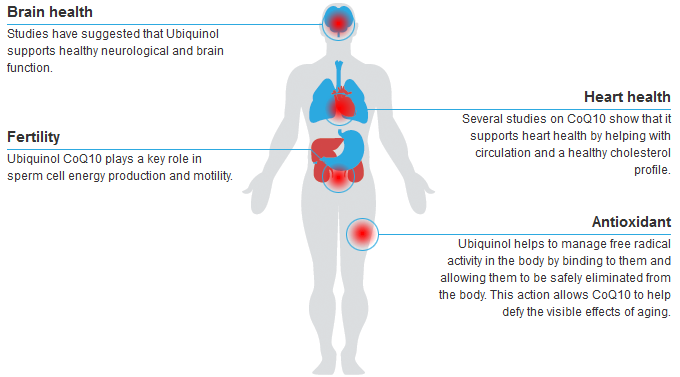As a bioavailable nutrient concentrated in organs with high metabolic activity, such as the heart, liver, and kidneys, Ubiquinol plays a crucial role in ATP synthesis and has been recommended by doctors for its cardiovascular benefits, including supporting normal blood pressure levels and improving long-term glycemic control in people with type 2 diabetes.
Ubiquinol should not be confused with the oxidised form of Coenzyme Q10, known as Ubiquinone. It is the active, non-oxidised form of CoQ10 and is biologically identical to the Ubiquinol in your body, meaning it's easily absorbed to deliver the maximum amount of benefits.
The beneficial effects of CoQ10 in Ubiquinol form include:
Ubiquinol is a naturally occurring nutrient in the body, with levels mostly concentrated in organs that use the most energy, including the heart, liver, and kidneys. The powerful antioxidant helps to support the organs from damage and provides cellular energy.
While the body produces its own CoQ10, in many cases this isn't enough, especially as we get older or have health issues. This has led to an increase in the number of people using CoQ10 supplements. A typical CoQ10 dosage ranges from 30mg, with trials showing success at levels of 100mg or more.2
It's important to know that the effect of taking supplements is not immediate. It may take up to eight weeks of daily supplementation to get the full benefits.
Ubiquinol is a fat-soluble nutrient and was identified some decades ago but was not able to be used in dietary supplements because of its instability. Its instability is due to the two extra electrons that it contains and is ready to ‘donate’ to mop up free radicals as soon as it is exposed to air or oxygen.
This "instability" of ubiquinol is a good thing. When paired with ubquinone, the two forms of CoQ10 can swap electrons between them in what is called a "redox" reaction (a flow of electrons that creates the energy needed to produce ATP).
By maintaining this ability to swap electrons, CoQ10 seals its role as the body’s ultimate biochemical energy provider.
While the two forms work together, the important thing to know if you are taking a CoQ10 supplement is that ubiquinol is the body's preferred form. It makes up most of the body's store of CoQ10 and is up to 70% easier to absorb.
Ubiquinol is the powerhouse of the cells, and essential for your body, particularly your heart.
It plays a crucial role in ATP synthesis. This naturally occurring process in the body produces energy and is considered to be one of the most important functions in cellular systems. Cellular energy is particularly important for organs with high metabolic activity, such as the heart. This in part is why ubiquinol is beneficial to the heart, which contains a higher concentration of CoQ10 than any other organ.
It also has other benefits to promote overall health as well as offering support for underlying health conditions.
In a recent study examining 27 different types of antioxidant supplements from 884 studies and covering 800,000-plus patients, the researchers found strong evidence CoQ10 was a leading supplement for those seeking cardiovascular benefits.3
Another benefit associated with ubiquinol is that it is thought to help support normal blood pressure levels, promoting healthy blood flow throughout the body, as well as supporting heart function. Remarkably, 50% of subjects in one study were able to cease at least one of their hypertensive medications following CoQ10 supplementation.4
People with type 2 diabetes may also benefit from CoQ10, with studies showing that CoQ10 supplementation may improve blood pressure and long-term glycaemic control for those suffering from type 2 diabetes.5
Coenzyme Q10 as a supplement has shown preliminary benefits in helping with migraine headaches. Adding 100 mg CoQ10 daily resulted in a “significant drop” in the frequency and severity of headaches.6
As mentioned earlier, ubiquinol is a powerful antioxidant that helps the body manage free radicals which ultimately helps support the immune system and increase our ability to fight disease and infections, which is why we have made it a key ingredient in our Omega 3 / QH Premium CoQ10 and Xtend-Quinol.
Studies have suggested that Ubiquinol supports healthy neurological and brain function.
Ubiquinol CoQ10 plays a key role in sperm cell energy production and motility.
Several studies on CoQ10 show that it supports heart health by helping with circulation, a healthy cholesterol profile and normal blood sugar levels.
Ubiquinol helps to manage free radical activity in the body by binding to them and allowing them to be safely eliminated from the body. This action allows CoQ10 to help defy the visible effects of aging.

Aging – As we age, the level of Ubiquinol in our body decreases. This is particularly the case once we surpass 40 years of age.
Statin medications – CoQ10 is important for people on cholesterol-lowering drugs such as statin medications. Statin medications drastically deplete the natural levels of CoQ10 or Ubiquinol by blocking the production of Ubiquinol in the liver, meaning you don’t get the full CoQ10 benefits you need and may suffer from issues including muscle pains. Ubiquinol is also an especially important nutrient to supplement if you have a family history of heart-related concerns.7
In the plasma of healthy people, more than 90% of CoQ10 exists in the reduced form, ubiquinol. The ratio of ubiquinol to CoQ10 in the plasma is a biomarker for oxidative stress, indicating that people suffering from strong oxidative stress may have lower levels of ubiquinol in their plasma.
Ubiquinol levels have also been shown to be lower in older individuals and those with cardiovascular, neurological, liver, and pancreatic-related conditions.
Researchers continue to find new CoQ10 benefits. A recent meta-analysis (2022) suggests that CoQ10 levels are lower in patients with Parkinson’s Disease and recommended future studies be run on this subject in the hope of finding a treatment.8
When choosing ingredients, we are very particular about our suppliers to make sure we get the best form of that ingredient for a specific product. When it comes to CoQ10 ubiquinol, we use two forms:
Ubiquinone, CoEnzyme Q10, CoQ10
1. Coenzyme Q10 in Cardiovascular and Metabolic Diseases: Current State of the Problem
2. Coenzyme Q10: The essential nutrient
3. Micronutrient Supplementation to Reduce Cardiovascular Risk
4. Treatment of essential hypertension with coenzyme Q10
5. Coenzyme Q10 improves blood pressure and glycaemic control: a controlled trial in subjects with type 2 diabetes
6. Effectiveness of coenzyme Q10 in prophylactic treatment of migraine headache: an open-label, add-
7. on, controlled trial Combining Ubiquinol With a Statin May Benefit Hypercholesterolaemic Patients With Chronic Heart Failure
8. Coenzyme Q10 and Parkinsonian Syndromes: A Systematic Review
Shipping calculated at checkout
